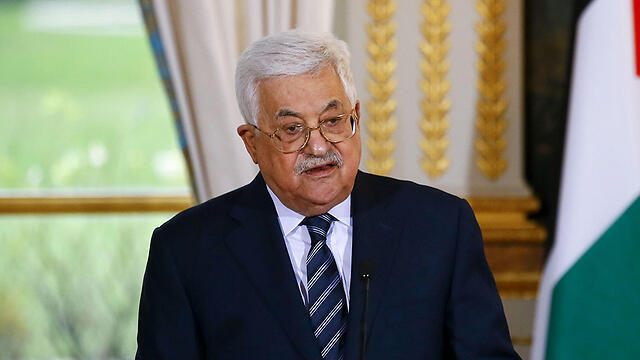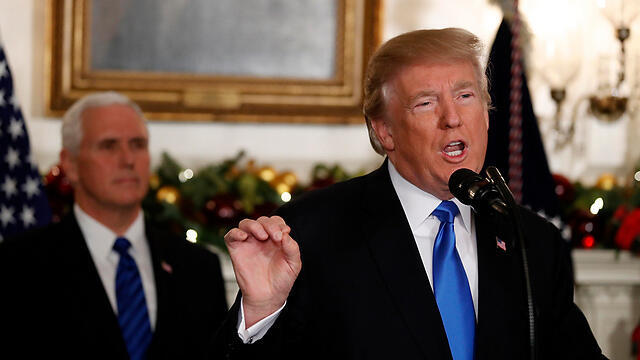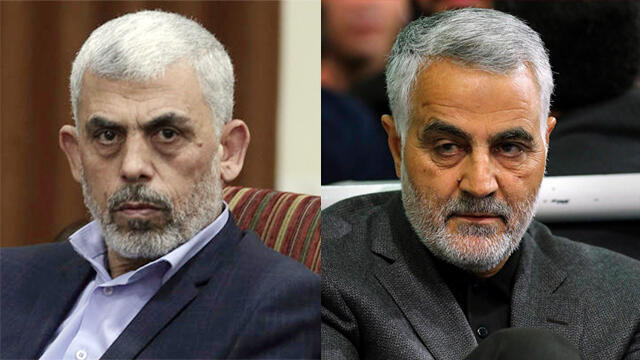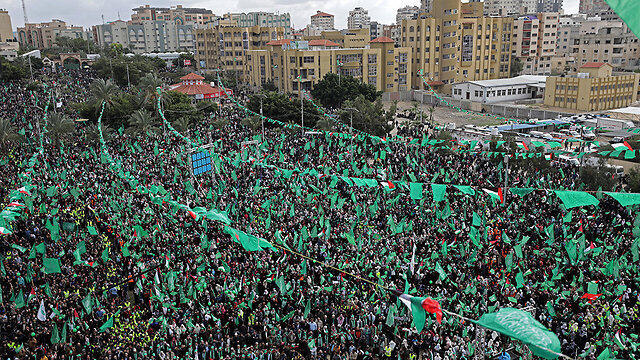Getting your Trinity Audio player ready...
A battle of narratives is underway between Palestinian Authority (PA) President Mahmoud Abbas and the leaders of Hamas. The outcome of this battle could impact many crucial events in the future.
Recognition of Jerusalem as Israel's capital by US President Donald Trump could serve either one of these narratives.
Hamas's narrative is about the need to use violence to promote the Palestinian cause, and holds that force is the only way to get Israel to make concessions. Hamas's violence is not only used against Israel. It is also directed against Abbas and the PA. Hamas's refusal to pay taxes, and its rebellion against the PA, is also a form of violence.
The narrative of Abbas, on the other hand, centers around the need to use diplomatic maneuvers, and to turn to the international community to push Israel into concessions. Abbas's position is that organized armed conflict against Israel is futile.
Events in recent years have all, from the Palestinian perspective, backed Hamas's narrative over that of Abbas.
The violence of the Second Intifada, from 2000 to 2005, resulted, in Palestinian eyes, in Israel's withdrawal from the Gaza Strip and the northern West Bank. The Israeli perception of these events is based on a completely different strategic view.
In June 2007, Hamas launched a successful, violent, and brutal revolution in Gaza, ousting Fatah and seizing power. From that moment, Hamas became the ruler of Gaza. It took a decade for Hamas to comprehend the weight of responsibility that comes from governing a population. But its narrative had scored an important victory in Hamas's eyes.
In 2008, Hamas's rocket attacks provoked the first Israeli military campaign against Gaza, Operation Cast Lead. By that time, Israel had classified Gaza as a terrorist entity—a classification that remains in place to this day. A strict Israeli policy was put in place in response to Gazan terrorism, restricting the entry of goods, and only items deemed essential were allowed into Gaza. The international community heavily criticized this Israeli policy, and the pressure on Jerusalem to change it was enormous.
Following Operation Cast Lead, Israel adopted a different civilian policy towards Gaza, making it more extensive and allowing more goods into Gaza. Hamas's message to Palestinians in Gaza, and in Judea and Samaria, was clear: Force was successfully used. Israel had "surrendered" and changed its policies, Hamas claimed.
In 2012, Egypt's President Mubarak was overthrown, and Muslim Brotherhood leader Muhammad Morsi won elections in Egypt. Hamas felt emboldened by the rise to power of a clear ally and sponsor.
It dug over 1000 tunnels linking Gaza to Egypt's Sinai to import all manner of goods—creating a tunnel economy worth hundreds of millions of dollars a year. Hamas felt confident enough to disconnect itself from the Fatah-run Palestinian Authority, and its president, Mahmoud Abbas. This, despite the fact that Abbas continued to pay 40% of the Palestinian Authority's budget to Gaza. Hamas was enjoying the best of both worlds.
That same year, Israel became involved in a second military operation against Hamas, Operation Pillar of Defense. This air campaign ended with a negotiated agreement, aimed at decreasing the smuggling of weapons into Gaza from Sinai. But it also ended with a changed Israeli policy, enlarging the number of people and goods that can cross in and out of Gaza.
Hamas did not really need the extra goods from Israel, due to the extensive network of tunnels from Sinai providing it with an outlet to an allied Egypt, but the development still allowed Hamas to claim another "victory," through the use of force.
Using force to break the "blockade"
In 2013, Egypt experienced a counter-revolution, and Morsi was deposed. His vision of turning Hamas into an Egyptian Islamist proxy was gone, and Egypt's policy towards Hamas was turned on its head. President El-Sisi, the new leader, systematically destroyed the tunnels linking Sinai to Gaza, and boycotted Hamas, which was no longer able to receive cash and supplies from the outside world. It could no longer smuggle weapons either.
As a result, Hamas increased the production of weapons domestically, using dual use items entering Gaza. Israel's ban on dual-use items grew astronomically.
Gaza's tunnel economy collapsed, and it became wholly dependent on more expensive imports from Israel. It also suddenly found itself dependent on the PA's budget, giving Abbas new leverage powers over Gaza. Hamas faced a potential humanitarian crisis in Gaza, growing shortages in water and electricity, and a mounting financial crisis which meant it could not even pay its own government officials.
Hamas began firing rockets again at Israel, vowing to break "the siege." The situation deteriorated into a conflict in the summer of 2014, lasting 52 days. At the end of that conflict, despite sustaining major casualties, and damage to Gaza, Hamas claimed that it faced the strongest military in the Middle East, and remained standing. It claimed victory, one that was very much in the eyes of the beholder.
At the end of the conflict, Israel again undertook an obligation to change its civilian policy and allow more goods in to the Strip.
Nevertheless, Israel did not create major strategic changes in its policies in Gaza, despite Hamas's narrative. Israel limited its steps to tactical changes.
Hamas continues to seek ways to force Israel to make strategic changes, something it has so far failed to do.
The competing narrative
Abbas's narrative is based on the following guidelines: No to violence, but also, dialogue with Israel is not an option for the time being, since there is no one on the Israeli side to talk to.
This leaves the door open to unilateral Palestinian steps. It also creates a suggestion to the Palestinian street, vaguely encouraging unrest, due to the signal that Israel is not a peace partner.
The announcement by US President Donald Trump recognizing Jerusalem as Israel's capital actually plays into Abbas's hands. His claim that there is no one to talk to in Israel can now be broadened to include the United States. Abbas will try to recruit the whole of the EU and the Arab world to his side following the announcement.
The move can be used by Abbas to create Palestinian unity, and move closer to Hamas. Currently, Abbas's legacy will be open to Palestinian accusations of causing a split among the Palestinians, dividing them into two entities.
Abbas can also use his toolbox of non-violent options to punish the Americans for being "too pro-Israeli," by undermining the coalition of pragmatic, anti-Iranian Sunni states that are allied to Washington.
These events are part of a major internal Palestinian battle over the right to be the legitimate representative of all Palestinians. If Abbas's narrative wins, it will consolidate Fatah as the top Palestinian representative. If Hamas's path of violence gains the upper hand, the Hamas vision of leading the PLO will become stronger. This is a battle that will ultimately decide who will receive the lion's share of political power in the Palestinian arena.
Col. Yacoubovich concluded his career in the IDF as management head of civilian sector at the Headquarters of the IDF for the Coordination of Govt. Activities in the Territories (COGAT)





